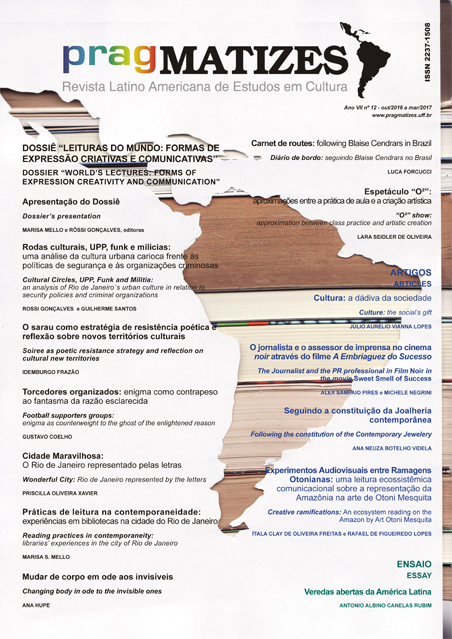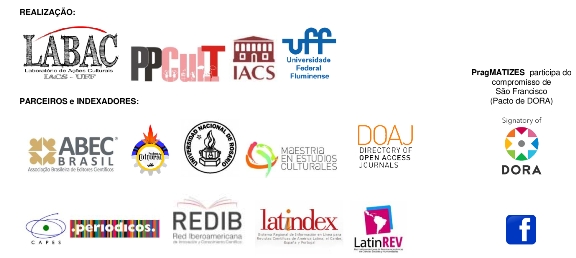Cultural Circles, UPP, Funk and Militia: an analysis of Rio de Janeiro´s urban culture in relation to security policies and criminal organizations
DOI:
https://doi.org/10.22409/pragmatizes.v0i12.10443Abstract
The major purpose of this article is to present a contribution to the field of public politics, using the relations and conversations between the cultural activities (that endeavor to develop cultural points in the less-favored areas, focused on social development) and the funk parties (that are judged as encouraging and dissemination of violence and drug trafficking), after UPP and militia groups were installed. This agent of the State has imposed a series of rules and restrictions for the development of cultural events, and the militia groups claim to fight against the traffic, but are surviving through extortions and other illegal ways. When examining the clash of political interests, we get to the fact that achieving a balance between forces is possible, but not before crossing a vast battlefield. And these battles happen at the symbolic field and, harshly, in territories that most need culture.Downloads
References
ALVES, Rôssi. Rio de Rimas. 1a Ed. Rio de Janeiro: Aeroplano, 2013.
ARAÚJO, Théo. Corredor da Morte e apologia ao crime foram o primeiro escândalo do funk. Réporter Terra: Funk, 2001. Disponível em: <http://www.terra.com.br/reporterterra/funk/dia3_not4.htm>. Acesso em: 24/03/2016
CERTEAU, Michel de. A invenção do cotidiano- artes do fazer. Petrópolis, Vozes, 1998.
COSTA, Julio Cesar da. [mensagem pessoal] Mensagem recebida por rossialves14@gmail.com em 11 de maio de 2015.
DICIONÁRIO ONLINE DE PORTUGUÊS. Significado de Retomar, 2009-2016. Disponível em: <http://www.dicio.com.br/retomar/> Acesso em: 15/04/2016
FACINA, Adriana. “Não me bate doutor”: Funk e criminalização da pobreza. Comunicação apresentada no VI ENECULT, Salvador, 2009.
FELIPPE, Jorge. Legislação – Lei Ordinária Câmara Municipal do Rio de Janeiro, 2011. Disponível em: http://mail.camara.rj.gov.br/APL/Legislativos/contlei.nsf/50ad008247b8f030032579ea0073d588/67120c4c1ae54a6603257a14006d2b1d?OpenDocument. Acesso em: 03/04/2016
GOMES, Tiago. Entrevista telefônica. Maio de 2015.
HARVEY, David. “A liberdade da cidade.” In: MARICATO, Erminia et Al.(org.). Cidades rebeldes: passe livre e as manifestações que tomaram as ruas do Brasil. São Paulo: Boitempo, 2013.
LEGIS WEB. Resolução Conjunta SESEG/SEDEC Nº 135 DE 20/02/2014. Disponível em: <https://www.legisweb.com.br/legislacao/?id=265890> Acesso em: 03 abr 2016.
MASSAL, Fellipe. Entrevista pelo Facebook. Disponível em: < https://www.facebook.com/felippecm?fref=ts > Acesso em: 05 mar. 2016
MICHAELIS. Dicionário de Português Online: Significado de “retomar”. Disponível em: <http://michaelis.uol.com.br/moderno/portugues/index.php?lingua=portugues-portugues&palavra=retomar> Acesso em: 15 abr. 2016
NEURÓTICO, Rico. Roda de Olaria: roda cultural de Olaria, 2015. Disponível em: < https://www.facebook.com/profile.php?id=100009228761029&fref=ts> Acesso em: 19 jun. 2015
OLIVEIRA, João Pacheco de. Mana. Rio de Janeiro, vol. 20, no 1, abril 2014
POLÍCIA CIVIL. Governo do Estado inaugura Cidade da Polícia, 2009. Disponível em: <http://www.policiacivil.rj.gov.br/exibir.asp?id=17701> Acesso em: 25 fev. 2016
RIO+SOCIAL. Programa, 2016. Disponível em: <http://www.riomaissocial.org/programa/>. Acesso em: 10 abril 2016.
SELEMA, Fernando. [mensagem pessoal]. Mensagem recebida por guilherme-santos@hotmail.com em 17/12/2016
SAHEL, Entrevista telefônica. Março de 2016
UNIDADE DE POLÍCIA PACIFICADORA. Perguntas Frequentes: O que é UPP? UPPRJ, 2016. Disponível em: <http://www.upprj.com/index.php/faq>. Acesso em: 10/04/2016
ZALUAR, A.; CONCEIÇÃO, I. S. Favelas sob o controle das milícias no Rio de Janeiro: que paz?. São Paulo em Perspectiva, São Paulo, Fundação Seade, v. 21, n. 2, p. 89-101, jul./dez. 2007. Disponível em: <http://www.seade.gov.br> Acesso em: 06 abr. 2016
Downloads
Published
How to Cite
Issue
Section
License
By forwarding an original to PragMATIZES, the authors agree that the copyright related to it is transferred to the Publishing. Articles and other writings are made available in PDF format from their publication, and they can be downloaded to institutional repositories and personal pages, provided that with their proper bibliographic indication.



